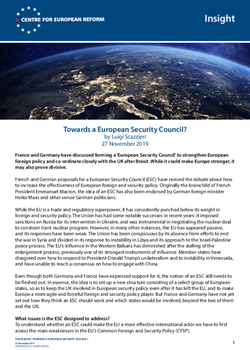
Towards a European Security Council?
France and Germany have discussed forming a ‘European Security Council’ to strengthen European foreign policy and co-ordinate closely with the UK after Brexit. While it could make Europe stronger, it may also prove divisive.
French and German proposals for a European Security Council (ESC) have revived the debate about how to increase the effectiveness of European foreign and security policy. Originally the brainchild of French President Emmanuel Macron, the idea of an ESC has also been endorsed by German foreign minister Heiko Maas and other senior German politicians.
French and German proposals for a European Security Council (ESC) have revived the debate about how to increase the effectiveness of European foreign and security policy.
While the EU is a trade and regulatory superpower, it has consistently punched below its weight in foreign and security policy. The Union has had some notable successes in recent years: it imposed sanctions on Russia for its intervention in Ukraine, and was instrumental in negotiating the nuclear deal to constrain Iran’s nuclear program. However, in many other instances, the EU has appeared passive, and its responses have been weak. The Union has been conspicuous by its absence from efforts to end the war in Syria and divided in its response to instability in Libya and its approach to the Israel-Palestine peace process. The EU’s influence in the Western Balkans has diminished after the stalling of the enlargement process, previously one of its strongest instruments of influence. Member-states have disagreed over how to respond to President Donald Trump’s unilateralism and to instability in Venezuela, and have unable to reach a consensus on how to engage with China.
Even though both Germany and France have expressed support for it, the notion of an ESC still needs to be fleshed out. In essence, the idea is to set up a new structure consisting of a select group of European states, so as to keep the UK involved in European security policy even after it has left the EU, and to make Europe a more agile and forceful foreign and security policy player. But France and Germany have not yet set out how they think an ESC should work and which states would be involved, beyond the two of them and the UK.
What issues is the ESC designed to address?
To understand whether an ESC could make the EU a more effective international actor we have to first assess the main weaknesses in the EU’s Common Foreign and Security Policy (CFSP).
First, there is often a broad lack of political will amongst member-states to undertake decisive action in any format, whether through the EU, NATO, or unilaterally. When most of its member-states do not want to act, EU foreign policy has often amounted to little more than ‘declaratory diplomacy’, issuing statements expressing concern or condemnation of a given crisis but without any concrete action to back them up. This unwillingness to act is most pronounced when it comes to taking military action, and is largely due to a lack of capabilities, which the EU is trying to address through a range of defence initiatives such as the European Defence Fund (EDF) and Permanent Structured Co-operation (PESCO). The EU also lacks a common ‘strategic culture’, a problem that the French-inspired European Intervention Initiative is designed to address.
An ESC could potentially make it easier and faster for member-states to agree on common responses when they already agree in broad terms, and could make it more difficult for reticent member-states to disrupt EU foreign policy.
Second, even when some member-states are willing to act, EU foreign policy is hobbled by the need for consensus between all members. As a result, the Union has often been paralysed by inability to reach a common position. Because it only takes one country to block a proposal, EU foreign policy is also vulnerable to outside influence. Even when countries have agreed to take action in principle, the EU has been hamstrung by disagreements about details and implementation. For example, despite their common interest in a stable Libya, France and Italy have been unable to agree on a common approach. The need for unanimity means that, even when member-states do manage to reach consensus, this tends to be based on the lowest common denominator position. The unwillingness of some member-states to bear significant economic costs meant that the EU’s sanctions on Russia, although symbolically important, were weaker than they may have been, and failed to persuade Moscow to reverse its intervention in Ukraine. Similarly, individual member-states have watered down EU statements condemning China’s human rights record.
Third, because it is hard to achieve a consensus among the 28, member-states have often chosen not to act through the EU at all. France and Germany’s efforts to solve the conflict in Ukraine through the so-called Normandy format have not involved the Union. For the most powerful member-states in particular, the EU is simply one of many forums through which they can conduct foreign policy, and they sometimes struggle to see the Union’s added value.
Could an ESC make EU foreign and security policy more effective?
Whatever form it takes, an ESC would not provide member-states with additional capabilities that make them more able to respond militarily, make the EU more willing to act if most member-states do not want to, or bridge large disagreements between member-states. However, an ESC could potentially make it easier and faster for member-states to agree on common responses when they already agree in broad terms, and could make it more difficult for reticent member-states to disrupt EU foreign policy.
An ESC is not the only way to achieve these ends. Rather than proposing to create a completely new decision-making structure, the European Commission has called for the introduction of qualified majority voting (QMV) in certain areas of CFSP: human rights, sanctions, and EU civilian missions. By abolishing the need for unanimity, QMV could make EU foreign policy more effective. But the introduction of QMV would itself require unanimous approval – which is unlikely in the near future, as some member-states fear being outvoted on issues that affect their security. And even if the EU adopted QMV, an outvoted state would have few incentives to implement a policy that it strongly disagreed with, and others would have no means of forcing it to do so.
Apart from circumventing some member-states’ resistance to majority voting, the main advantage of an ESC could be its role as a structure allowing the UK to remain plugged in to European decision-making and member-states to continue close co-ordination with one of Europe’s major foreign policy players. Beyond that, the ESC’s ability to make EU foreign policy more effective will depend on its precise nature. An ESC could take four forms:
- First, the ESC could be a wholly new body within the EU’s institutional architecture. But this would require treaty change, as the EU treaties currently do not allow for such a structure, and securing member-states’ unanimous approval would be very difficult, not least because smaller states would fear being excluded from important decisions taken in the ESC.
- Second, the ESC could also be a dedicated meeting of the European Council, with all member-states plus the UK as non-voting member, with the aim of fostering a more regular strategic debate between national leaders on European foreign policy. While this format would be less divisive, and would keep the UK involved in discussions about European foreign policy, it probably would not greatly increase the EU’s effectiveness.
- Third, the ESC could be an intergovernmental forum outside EU structures, involving only a select few member-states and the UK. By consulting with each other and reaching a common position outside the EU, members of the ESC could more effectively push the EU to adopt policies that go beyond the lowest common denominator. For example, while the ESC could not directly impose sanctions, if its members agreed, the ESC could make it easier for them to use their combined influence to convince the EU as a whole to adopt them. Other member-states would find it harder to object to a sanctions proposal if a core group had already agreed.
- Fourth, the ESC could simply be an expanded E3 format, the informal arrangement though which France, Germany, and the UK discuss policy towards Iran. This would presumably be the smallest grouping, and would allow France and Germany to continue co-ordinating closely with the UK and act as a vanguard in European foreign policy.
The more exclusive and formal the format of co-operation, the greater the potential for it to lead to discord between EU member-states. A move to formalise co-operation between a select few member-states in a grand-sounding European Security Council risks being highly divisive, as there is a risk that other member-states may interpret it as a move to make Europe more independent of the US – especially in the context of Macron’s recent comments on the “brain death” of NATO. The issue of divisiveness could potentially be mitigated if the ESC was modelled on the UN Security Council, with permanent and non-permanent members. But this would be complicated to agree to, and it may prove easier to simply expand the E3.
The more exclusive and formal the format of co-operation, the greater the potential for it to lead to discord between EU member-states.
Whatever format they eventually chose, France and Germany should prioritise solutions that do not undermine the EU’s cohesion. Ideally all member-states with a specific interest in a given issue should be involved in any small group co-operation. Moreover, the work of small formats should be linked as closely to the EU level as possible, to give it greater legitimacy. For example, small group co-operation could always include a EU institutional figure, such as the High Representative, as in the E3/EU format. Moreover, member-states should also attempt to make better use of the EU’s foreign policy structures already at their disposal. It will always be more legitimate if member-states conduct their foreign policy through the EU itself. The usefulness of the High Representative and the EEAS will be increased if they are charged with specific tasks and empowered with a clear mandate to act on the EU’s behalf. Where possible, the EU should explicitly endorse small group initiatives: when member-states agree on a certain policy, but implementation is the problem, the Council could task a group of member-states with implementing the common decision, making use of funding and institutional support from the European Commission.
A move to formalise co-operation between a select few member-states in a grand-sounding European Security Council risks being highly divisive.
The Franco-German proposal for an ESC remains vague and, depending on its structure, risks undermining EU cohesion. But increasing informal consultation and co-ordination between groups of member-states and the UK, whether through the ESC or in other formats, could help make Europe a more agile and forceful player on the global stage. Over time, closer consultation and co-ordination could contribute to fostering a common understanding of the strategic challenges facing the EU, which in turn would lead to a greater willingness to co-ordinate, and a stronger European foreign policy.
Luigi Scazzieri is a research fellow at the Centre for European Reform.


Comments
Add new comment